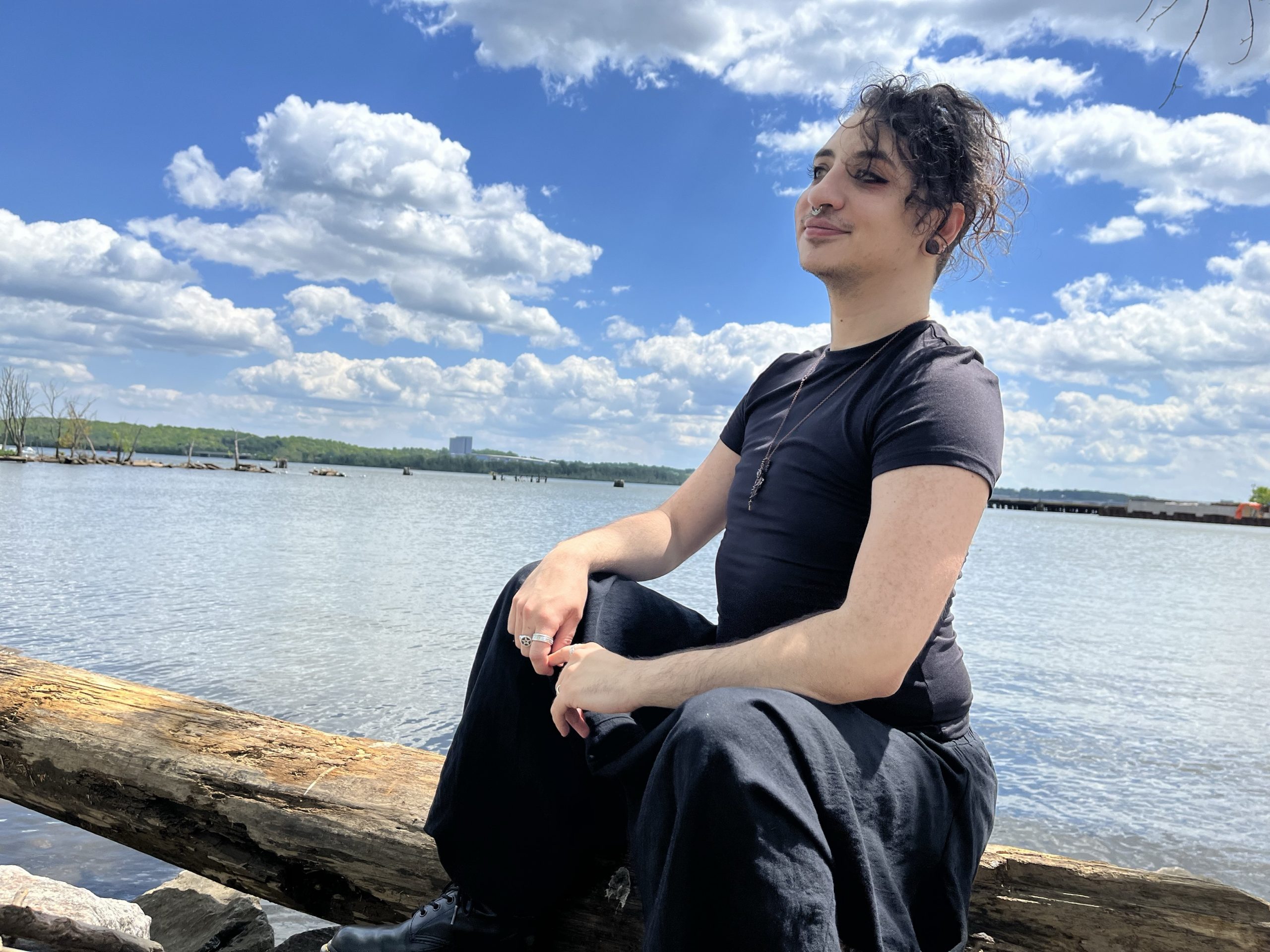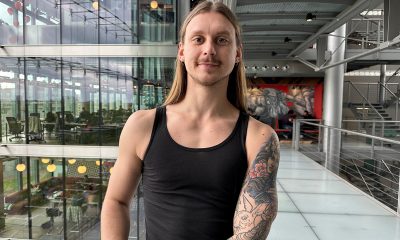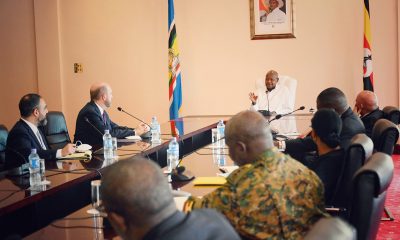Opinions
University students have a right to protest
But they must not threaten Jewish students on campus

I support the right of students at Columbia University, and other colleges, to protest. They must understand they are protesting on private space. What I also find interesting is how many of them see their right to protest, and right to free speech.
The First Amendment gives us a right to free speech, but it doesn’t specify what exactly is meant by freedom of speech. Defining what types of speech should and shouldn’t be protected by law, has been left to the courts. Clearly free speech has its limits. Obscene material such as child pornography, plagiarism of copyrighted material, defamation, or threats, aren’t allowed. Also not protected under the First Amendment is speech inciting illegal actions, or soliciting others to commit crimes. Private employers, and universities, are allowed to set their own guidelines as to what speech is allowed for their employees, and on their campuses.
The debate over student protests at Columbia University is not a new one. I remember when the Student Afro Society (SAS) and the basically all-white Students for a Democratic Society (SDS), demonstrated and took over buildings at Columbia in 1968. Some were protesting the Vietnam War, others what they deemed would be a segregated gym in Morningside Heights, and Columbia’s infringement on a minority community. Both legitimate causes. Those demonstrations took a nasty turn when students took over buildings and cut off water and electricity to them. They held a sit-in, in the president’s office, and took a dean hostage. Police were called and in some cases it got violent. We are not at the 1968 stage yet in the current demonstrations, and if outside agitators don’t get involved, it may not get to that.
I agree with some of what the demonstrators are calling for, including having Israel rethink how it is conducting this war, protection for the Palestinian people, and immediately providing them with food and medicine. I don’t agree with their call to support BDS, which is the disinvestment in Israel. BDS is a Palestinian non-violent movement begun in 2005. I also see hypocrisy in what some of the protesters are saying. While they claim Israel is committing genocide in Gaza, which many disagree with, the same people are calling for genocide against Israel by supporting Hamas. It is Hamas’s stated goal to wipe Israel off the face of the earth, “from the river to the sea.”
Calling out Israel for its tactics, is not anti-Semitic. But attacking, and calling out Jewish students on campus, telling them to go back to Poland, which we have seen on video, and making them feel unsafe, is. Then there is the totally outrageous statement, “Zionists don’t deserve to live.” made by Khymani James, one of the student leaders of the Columbia, pro-Palestinian student protest encampment. He made the comments during and after a disciplinary hearing with Columbia administrators that he recorded and then posted on Instagram. I hope the president of Columbia University will be able to negotiate an agreement with the peaceful student demonstrators, including amnesty for some of those students who were arrested, if the students agree to certain parameters for continuing demonstrations. One being they cannot make other students feel unsafe on campus.
I find it abhorrent that House Speaker Mike Johnson has inserted himself at Columbia University, calling for President Shafik to quit. It is a totally inappropriate political stunt. The same goes for Rep. Elise Stefanik (R-N.Y.) who called for the Biden administration to revoke the student visas of all foreign students who are demonstrating. Those students came to the United States for an education, because we are a free country. If they agree to the guidelines of the university, and what is recognized as acceptable free speech, we should continue to welcome them, and allow them to voice their feelings. Again, as long as they don’t threaten others while they do so.
I am Jewish, and a strong supporter of the State of Israel. That support has not stopped me from calling on the Israeli people to rid themselves of Netanyahu, and his right-wing government. I oppose the settlements, and support a real two-state solution. But for that to happen not only will the Netanyahu government have to go, but the Palestinian people will have to reject Hamas. I have not heard the call for Hamas to release the hostages they took, whether those hostages are alive or dead at this time.
I strongly believe in the right to protest, and for Americans, and those here legally, to speak out. In 1969, I came to D.C. to protest the Vietnam War in front of the Justice Department and was tear-gassed. I had a right to protest in a public space. Since that time, I have participated in many demonstrations. Some around the White House supporting rights for the disabled community, LGBTQ rights, women’s rights, and in the ‘80s, demanding the government recognize, and do something about HIV/AIDS. The difference was in these demonstrations, those who disagreed were not threatened. The demonstrations I participated in, took place in public space, not the quad at Columbia University, or other university campuses, which is private space. Students who protest there must understand that.
My hope is none of the peaceful student demonstrators at Columbia, and other institutions, those who do not threaten fellow students, are thrown out, losing the chance to earn a degree. Those students chose to go to their schools because they thought they would get a good education, and believed graduating from those schools would be good for their futures.
Peter Rosenstein is a longtime LGBTQ rights and Democratic Party activist. He writes regularly for the Blade.
Opinions
Advocating for the Queer Community On and Off The Job
One organ donor can save up to eight lives

As a proud trans man, Kai Sprando recognizes the importance of visibility and education in fostering understanding and acceptance of the LGBTQIA+ community. His commitment to spreading awareness and advocating for queer experiences is something he champions on both a personal and professional level.
In 2019, Kai began working in the organ donation field as it provides a convergence of purpose and opportunity, which he embraced wholeheartedly to make a difference in people’s lives. Kai works as an Instructional Designer at Infinite Legacy, where he develops educational resources, curriculum and training plans primarily for clinical staff. At Infinite Legacy, he found not just a job, but a community of compassionate individuals who support him in every aspect of his trans journey.
In Kai’s eyes, organ donation is more than a medical procedure; it is a lifeline and second chance for individuals with end stage organ failure. He also sees it as a way for organ donors to continue their legacy of kindness beyond their time on Earth. He is deeply moved by the profound impact that one organ donor has to save up to eight lives. This knowledge fuels Kai’s passion for his work, driving him to encourage others to learn about the transformative power of organ donation.
For Kai, education is key. He believes that the more people know about and understand organ donation, the better equipped they are to make informed decisions and advocate for the cause.
“The opportunity to make a difference by saving lives as an organ donor is very powerful. When I pass, I want to know that if nothing else, I tried my best to help others. That’s what life is all about to me…finding ways to make the hard things in life a little less hard, one act of kindness at a time.” said Kai.
With his background in teaching and his viewpoint as a trans man, Kai has been invited to and spoken at several national organ donation and transplantation conferences providing insight and perspective on what it means to be trans and queer, allowing his peers the ability to be more effective and caring while interacting with LGBTQIA+ people and their families.
Kai is passionate about advocating for marginalized communities and through his openness, vulnerability and willingness to share his lived experiences, Kai contributes to positive change in healthcare, particularly around gender and sexuality representation.
As he continues to advocate for change and build a better infrastructure around LGBTQIA+ needs and representation, Kai remains hopeful for the future. He has seen the important shifts and positive changes in healthcare in recent years and is determined to keep pushing for progress, one conversation at a time.
Everyone can register to be an organ donor. To learn more, visit infinitelegacy.org.
Opinions
Proposed Medicaid rule may hurt people with HIV
A freeze on drug development would be a crushing blow

We’re fortunate to exist in a world where it’s possible to live for a long time with HIV. Medical science has made astounding progress since the 1980s, when a positive diagnosis was considered a death sentence. Queer activism helped bring about the shifts in policy and attitude that made this success possible.
But our job isn’t over yet.
HIV isn’t spread evenly across the United States. In urban areas with high poverty, it’s as prevalent as it is in low-income countries with generalized HIV epidemics, like Ethiopia and Burundi. This means that almost 40% of Americans with HIV get their health coverage through Medicaid, the government insurance plan for low-income people. And recently proposed changes to the program could halt future progress toward finding a cure.
Under the current Medicaid Drug Rebate Program, Medicaid receives a sizeable manufacturer rebate on brand-name drugs — calculated in part based on either 23.1% off the average price of the drug, or the best price available to another purchaser if that discount is higher.
But now, the Centers for Medicare & Medicaid Services (CMS), the federal agency that runs Medicaid, has proposed a new rule. It would require calculating a medicine’s best price by stacking the rebates and discounts on a single unit of drug that a manufacturer provides to different eligible purchasers.
Due to the interplay with other recent changes to Medicaid, in some cases, the total markdown could exceed 100% of the average price of the drug — meaning manufacturers would be forced to effectively sell the medications at a loss to Medicaid.
This could mean trouble for drugs whose largest market is Medicaid, like those that treat HIV. If manufacturers and their investors decide that it’s no longer financially viable to make drugs that primarily serve disadvantaged patients, then those medications might not be developed at all.
That’s concerning, given that many groundbreaking HIV therapies stemmed from private sector research and development. And with research inching ever closer to a cure, a freeze on HIV drug development would be a crushing blow to those of us living with the disease.
The proposed rule change also threatens the search for a cure with policies that target cell and gene therapies, areas in which scientists have recently made promising HIV-related breakthroughs. When cell and gene therapies come to market after years of research, they can often have high up-front costs — sometimes more than $1 million per patient. That’s in part because the field is so cutting edge and the therapies deliver long-term benefits, and in part because research failures in drug development are far more common than successes.
One CMS policy change would require manufacturers to report their research and development costs for specific high-price medicines to the agency. The government could make such information public, and use it to challenge drug prices. In addition, the rule proposed to specifically target accelerated approval drugs, a pathway that has allowed many patients with HIV/AIDS early access to lifesaving treatments.
The problem is that for every drug candidate in clinical trials that succeeds, nine fail. Sometimes they fail after years of research and hundreds of millions of dollars invested. To keep the research money flowing, that one success needs to make up for the cost of the nine that washed out.
If Medicaid drives drug mandatory rebates so low that companies can’t recoup their investments, it will discourage them from pursuing the most cutting-edge avenues of research — and put some of them out of business. Biotech investors will abandon gene therapy and seek out more stable markets, and HIV research will suffer. Ultimately, patients living with HIV who rely on Medicaid will miss out on potential cures that never get developed. They may also lack access to therapies that do get created, given that the companies behind them could pull out of the Medicaid market altogether.
Forty percent of Americans living with HIV are Black, and 63% are gay and bisexual men.
As a queer Black man with HIV myself, I know all too well how devastating it is to receive that diagnosis, especially when you’re underinsured and living in poverty. But I also know that effective treatment can vastly improve quality of life. Without the sacrifices and the activism of those who came before us, HIV might still be a death sentence.
It’s up to us to continue the fight now. Our community deserves a shot at a cure. CMS officials urgently need to reverse course on this disastrous proposal. And if they fail to do so, it’s incumbent on HIV activists to push for the federal government to adopt policies that support affordable HIV treatments and research funding.
Guy Anthony is the president and CEO of Black, Gifted & Whole.
Commentary
BookMen DC: Still going strong at 25
Celebrating the longest-running LGBTQ literary group in the area

On May 11, 1999, what was originally known as the Potomac Gay Men’s Book Group convened for its first meeting. A lot has changed over the ensuing quarter-century, starting with our name. But our identity remains true to the description on our blog: “an informal group of men who are interested in gay literature (both fiction and non-fiction).”
Our founder, Bill Malone, worked at the Whitman-Walker Clinic and started the group using donations of remainder books from a wholesaler in New York. Soon after that, members decided to get their own books, and began purchasing them through Lambda Rising, which offered a discount for such orders until it closed in 2010. The group later renamed itself BoysnBooks, and then became BookMen DC in 2007, which is also when we started our blog.
Following Bill’s tenure, Tom Wischer, Greg Farber and Tim Walton (who set up our blog) have served as our facilitators. I succeeded Tim in that role in 2009, and am grateful to him and all my predecessors for laying such a solid foundation for our group.
Twenty-five years after our founding, we are the longest-running LGBTQ literary group in the DMV. So far, we have discussed nearly 400 books, ranging from classics like Plato’s Symposium to graphic novels, gay history and memoirs, and novels by James Baldwin, Michael Cunningham, E.M. Forster and Edmund White—to name just a few of the many authors and genres we’ve explored.
Currently, we have more than 120 names on our mailing list, of whom about a quarter attend meetings at least occasionally. (Average attendance at our meetings is about 10.) Our members variously consider themselves gay, queer, bisexual, or transgender, and those varying perspectives enhance our discussions. I would be remiss if I didn’t acknowledge that, like many LGBTQ organizations, we are not nearly as diverse as I wish we were. Although we do have young members and people of color within our ranks, we are predominantly white and middle-aged or older. We have tried various forms of outreach to further diversify our membership, and will keep working on that.
How has BookMen DC not just survived, but thrived, when so many other book clubs and LGBTQ groups have foundered? I would identify several factors.
First and foremost, we are welcoming. We have no minimum attendance requirements and charge no dues. And we expressly encourage members to join us at meetings even if they haven’t finished the selection we’re discussing.
We are also collaborative. Each fall, members nominate titles for the next year’s reading list; I then compile those suggestions into a list for members to weigh in on, and the results of that vote determine what we will read.
Finally, we are flexible and adaptable. Over the years, we have met in locations all over the District. Currently, we meet on the first Wednesday of each month at the Cleveland Park Library (3310 Connecticut Ave. NW) from 6:30-7:30 p.m. to discuss entire books; afterward, those interested go to dinner at a neighborhood restaurant.
When the pandemic struck four years ago, we took a break for a couple of months before moving operations online. (Thank God for Zoom!) Even after the venues where we’d been meeting reopened, we have continued to meet virtually on the third Wednesday of each month, from 7-8 p.m. During those Zoom sessions, we discuss sections of anthologies of poetry and short stories, as well as short standalone works (e.g., plays and novellas).
If you enjoy LGBTQ literature and would like to try us out, visit our blog: https://bookmendc.blogspot.com/ and click the link to email me. We’d love to meet you!
Steven Alan Honley, a semi-retired musician, editor, and writer, has been a member of BookMen DC since 2000 and its facilitator since 2009.



















